Jingtong Gao
Enhancing Conversational Agents via Task-Oriented Adversarial Memory Adaptation
Jan 29, 2026Abstract:Conversational agents struggle to handle long conversations due to context window limitations. Therefore, memory systems are developed to leverage essential historical information. Existing memory systems typically follow a pipeline of offline memory construction and update, and online retrieval. Despite the flexible online phase, the offline phase remains fixed and task-independent. In this phase, memory construction operates under a predefined workflow and fails to emphasize task relevant information. Meanwhile, memory updates are guided by generic metrics rather than task specific supervision. This leads to a misalignment between offline memory preparation and task requirements, which undermines downstream task performance. To this end, we propose an Adversarial Memory Adaptation mechanism (AMA) that aligns memory construction and update with task objectives by simulating task execution. Specifically, first, a challenger agent generates question answer pairs based on the original dialogues. The constructed memory is then used to answer these questions, simulating downstream inference. Subsequently, an evaluator agent assesses the responses and performs error analysis. Finally, an adapter agent analyzes the error cases and performs dual level updates on both the construction strategy and the content. Through this process, the memory system receives task aware supervision signals in advance during the offline phase, enhancing its adaptability to downstream tasks. AMA can be integrated into various existing memory systems, and extensive experiments on long dialogue benchmark LoCoMo demonstrate its effectiveness.
PRISM: Purified Representation and Integrated Semantic Modeling for Generative Sequential Recommendation
Jan 23, 2026Abstract:Generative Sequential Recommendation (GSR) has emerged as a promising paradigm, reframing recommendation as an autoregressive sequence generation task over discrete Semantic IDs (SIDs), typically derived via codebook-based quantization. Despite its great potential in unifying retrieval and ranking, existing GSR frameworks still face two critical limitations: (1) impure and unstable semantic tokenization, where quantization methods struggle with interaction noise and codebook collapse, resulting in SIDs with ambiguous discrimination; and (2) lossy and weakly structured generation, where reliance solely on coarse-grained discrete tokens inevitably introduces information loss and neglects items' hierarchical logic. To address these issues, we propose a novel generative recommendation framework, PRISM, with Purified Representation and Integrated Semantic Modeling. Specifically, to ensure high-quality tokenization, we design a Purified Semantic Quantizer that constructs a robust codebook via adaptive collaborative denoising and hierarchical semantic anchoring mechanisms. To compensate for information loss during quantization, we further propose an Integrated Semantic Recommender, which incorporates a dynamic semantic integration mechanism to integrate fine-grained semantics and enforces logical validity through a semantic structure alignment objective. PRISM consistently outperforms state-of-the-art baselines across four real-world datasets, demonstrating substantial performance gains, particularly in high-sparsity scenarios.
BlossomRec: Block-level Fused Sparse Attention Mechanism for Sequential Recommendations
Dec 15, 2025Abstract:Transformer structures have been widely used in sequential recommender systems (SRS). However, as user interaction histories increase, computational time and memory requirements also grow. This is mainly caused by the standard attention mechanism. Although there exist many methods employing efficient attention and SSM-based models, these approaches struggle to effectively model long sequences and may exhibit unstable performance on short sequences. To address these challenges, we design a sparse attention mechanism, BlossomRec, which models both long-term and short-term user interests through attention computation to achieve stable performance across sequences of varying lengths. Specifically, we categorize user interests in recommendation systems into long-term and short-term interests, and compute them using two distinct sparse attention patterns, with the results combined through a learnable gated output. Theoretically, it significantly reduces the number of interactions participating in attention computation. Extensive experiments on four public datasets demonstrate that BlossomRec, when integrated with state-of-the-art Transformer-based models, achieves comparable or even superior performance while significantly reducing memory usage, providing strong evidence of BlossomRec's efficiency and effectiveness.The code is available at https://github.com/ronineume/BlossomRec.
Generative Auto-Bidding in Large-Scale Competitive Auctions via Diffusion Completer-Aligner
Sep 03, 2025Abstract:Auto-bidding is central to computational advertising, achieving notable commercial success by optimizing advertisers' bids within economic constraints. Recently, large generative models show potential to revolutionize auto-bidding by generating bids that could flexibly adapt to complex, competitive environments. Among them, diffusers stand out for their ability to address sparse-reward challenges by focusing on trajectory-level accumulated rewards, as well as their explainable capability, i.e., planning a future trajectory of states and executing bids accordingly. However, diffusers struggle with generation uncertainty, particularly regarding dynamic legitimacy between adjacent states, which can lead to poor bids and further cause significant loss of ad impression opportunities when competing with other advertisers in a highly competitive auction environment. To address it, we propose a Causal auto-Bidding method based on a Diffusion completer-aligner framework, termed CBD. Firstly, we augment the diffusion training process with an extra random variable t, where the model observes t-length historical sequences with the goal of completing the remaining sequence, thereby enhancing the generated sequences' dynamic legitimacy. Then, we employ a trajectory-level return model to refine the generated trajectories, aligning more closely with advertisers' objectives. Experimental results across diverse settings demonstrate that our approach not only achieves superior performance on large-scale auto-bidding benchmarks, such as a 29.9% improvement in conversion value in the challenging sparse-reward auction setting, but also delivers significant improvements on the Kuaishou online advertising platform, including a 2.0% increase in target cost.
Graph Federated Learning for Personalized Privacy Recommendation
Aug 08, 2025Abstract:Federated recommendation systems (FedRecs) have gained significant attention for providing privacy-preserving recommendation services. However, existing FedRecs assume that all users have the same requirements for privacy protection, i.e., they do not upload any data to the server. The approaches overlook the potential to enhance the recommendation service by utilizing publicly available user data. In real-world applications, users can choose to be private or public. Private users' interaction data is not shared, while public users' interaction data can be shared. Inspired by the issue, this paper proposes a novel Graph Federated Learning for Personalized Privacy Recommendation (GFed-PP) that adapts to different privacy requirements while improving recommendation performance. GFed-PP incorporates the interaction data of public users to build a user-item interaction graph, which is then used to form a user relationship graph. A lightweight graph convolutional network (GCN) is employed to learn each user's user-specific personalized item embedding. To protect user privacy, each client learns the user embedding and the scoring function locally. Additionally, GFed-PP achieves optimization of the federated recommendation framework through the initialization of item embedding on clients and the aggregation of the user relationship graph on the server. Experimental results demonstrate that GFed-PP significantly outperforms existing methods for five datasets, offering superior recommendation accuracy without compromising privacy. This framework provides a practical solution for accommodating varying privacy preferences in federated recommendation systems.
HiD-VAE: Interpretable Generative Recommendation via Hierarchical and Disentangled Semantic IDs
Aug 06, 2025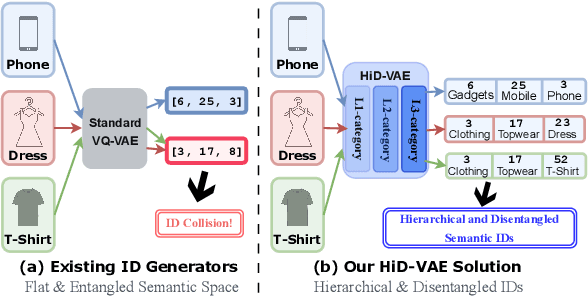
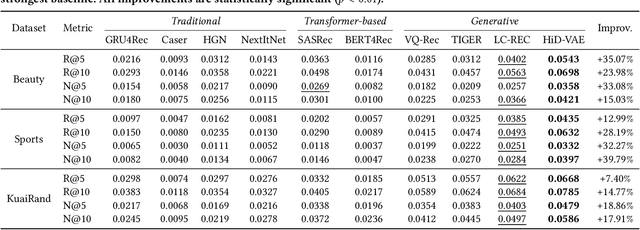
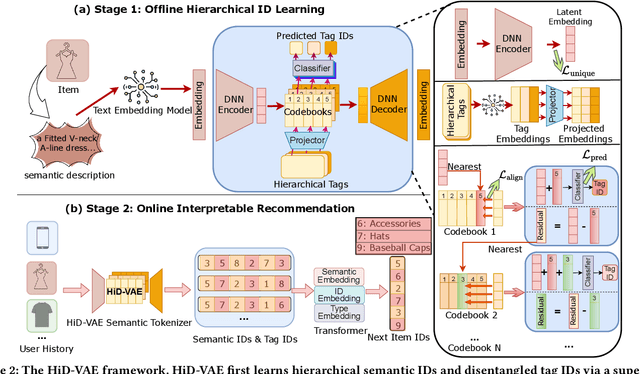
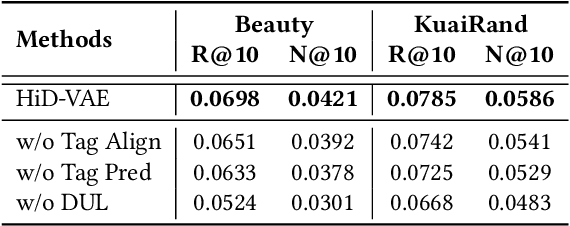
Abstract:Recommender systems are indispensable for helping users navigate the immense item catalogs of modern online platforms. Recently, generative recommendation has emerged as a promising paradigm, unifying the conventional retrieve-and-rank pipeline into an end-to-end model capable of dynamic generation. However, existing generative methods are fundamentally constrained by their unsupervised tokenization, which generates semantic IDs suffering from two critical flaws: (1) they are semantically flat and uninterpretable, lacking a coherent hierarchy, and (2) they are prone to representation entanglement (i.e., ``ID collisions''), which harms recommendation accuracy and diversity. To overcome these limitations, we propose HiD-VAE, a novel framework that learns hierarchically disentangled item representations through two core innovations. First, HiD-VAE pioneers a hierarchically-supervised quantization process that aligns discrete codes with multi-level item tags, yielding more uniform and disentangled IDs. Crucially, the trained codebooks can predict hierarchical tags, providing a traceable and interpretable semantic path for each recommendation. Second, to combat representation entanglement, HiD-VAE incorporates a novel uniqueness loss that directly penalizes latent space overlap. This mechanism not only resolves the critical ID collision problem but also promotes recommendation diversity by ensuring a more comprehensive utilization of the item representation space. These high-quality, disentangled IDs provide a powerful foundation for downstream generative models. Extensive experiments on three public benchmarks validate HiD-VAE's superior performance against state-of-the-art methods. The code is available at https://anonymous.4open.science/r/HiD-VAE-84B2.
Navigate the Unknown: Enhancing LLM Reasoning with Intrinsic Motivation Guided Exploration
May 23, 2025Abstract:Reinforcement learning (RL) has emerged as a pivotal method for improving the reasoning capabilities of Large Language Models (LLMs). However, prevalent RL approaches such as Proximal Policy Optimization (PPO) and Group-Regularized Policy Optimization (GRPO) face critical limitations due to their reliance on sparse outcome-based rewards and inadequate mechanisms for incentivizing exploration. These limitations result in inefficient guidance for multi-step reasoning processes. Specifically, sparse reward signals fail to deliver effective or sufficient feedback, particularly for challenging problems. Furthermore, such reward structures induce systematic biases that prioritize exploitation of familiar trajectories over novel solution discovery. These shortcomings critically hinder performance in complex reasoning tasks, which inherently demand iterative refinement across ipntermediate steps. To address these challenges, we propose an Intrinsic Motivation guidEd exploratioN meThOd foR LLM Reasoning (i-MENTOR), a novel method designed to both deliver dense rewards and amplify explorations in the RL-based training paradigm. i-MENTOR introduces three key innovations: trajectory-aware exploration rewards that mitigate bias in token-level strategies while maintaining computational efficiency; dynamic reward scaling to stabilize exploration and exploitation in large action spaces; and advantage-preserving reward implementation that maintains advantage distribution integrity while incorporating exploratory guidance. Experiments across three public datasets demonstrate i-MENTOR's effectiveness with a 22.39% improvement on the difficult dataset Countdown-4.
Generative Auto-Bidding with Value-Guided Explorations
Apr 20, 2025Abstract:Auto-bidding, with its strong capability to optimize bidding decisions within dynamic and competitive online environments, has become a pivotal strategy for advertising platforms. Existing approaches typically employ rule-based strategies or Reinforcement Learning (RL) techniques. However, rule-based strategies lack the flexibility to adapt to time-varying market conditions, and RL-based methods struggle to capture essential historical dependencies and observations within Markov Decision Process (MDP) frameworks. Furthermore, these approaches often face challenges in ensuring strategy adaptability across diverse advertising objectives. Additionally, as offline training methods are increasingly adopted to facilitate the deployment and maintenance of stable online strategies, the issues of documented behavioral patterns and behavioral collapse resulting from training on fixed offline datasets become increasingly significant. To address these limitations, this paper introduces a novel offline Generative Auto-bidding framework with Value-Guided Explorations (GAVE). GAVE accommodates various advertising objectives through a score-based Return-To-Go (RTG) module. Moreover, GAVE integrates an action exploration mechanism with an RTG-based evaluation method to explore novel actions while ensuring stability-preserving updates. A learnable value function is also designed to guide the direction of action exploration and mitigate Out-of-Distribution (OOD) problems. Experimental results on two offline datasets and real-world deployments demonstrate that GAVE outperforms state-of-the-art baselines in both offline evaluations and online A/B tests. The implementation code is publicly available to facilitate reproducibility and further research.
Joint Modeling in Recommendations: A Survey
Feb 28, 2025Abstract:In today's digital landscape, Deep Recommender Systems (DRS) play a crucial role in navigating and customizing online content for individual preferences. However, conventional methods, which mainly depend on single recommendation task, scenario, data modality and user behavior, are increasingly seen as insufficient due to their inability to accurately reflect users' complex and changing preferences. This gap underscores the need for joint modeling approaches, which are central to overcoming these limitations by integrating diverse tasks, scenarios, modalities, and behaviors in the recommendation process, thus promising significant enhancements in recommendation precision, efficiency, and customization. In this paper, we comprehensively survey the joint modeling methods in recommendations. We begin by defining the scope of joint modeling through four distinct dimensions: multi-task, multi-scenario, multi-modal, and multi-behavior modeling. Subsequently, we examine these methods in depth, identifying and summarizing their underlying paradigms based on the latest advancements and potential research trajectories. Ultimately, we highlight several promising avenues for future exploration in joint modeling for recommendations and provide a concise conclusion to our findings.
From Principles to Applications: A Comprehensive Survey of Discrete Tokenizers in Generation, Comprehension, Recommendation, and Information Retrieval
Feb 18, 2025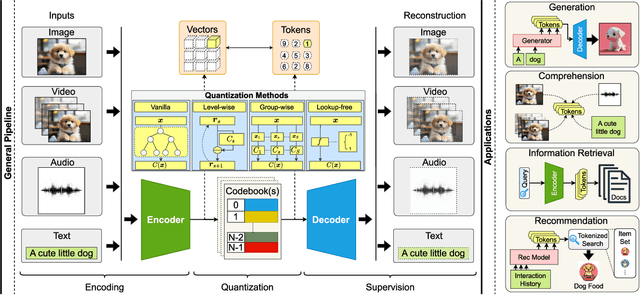
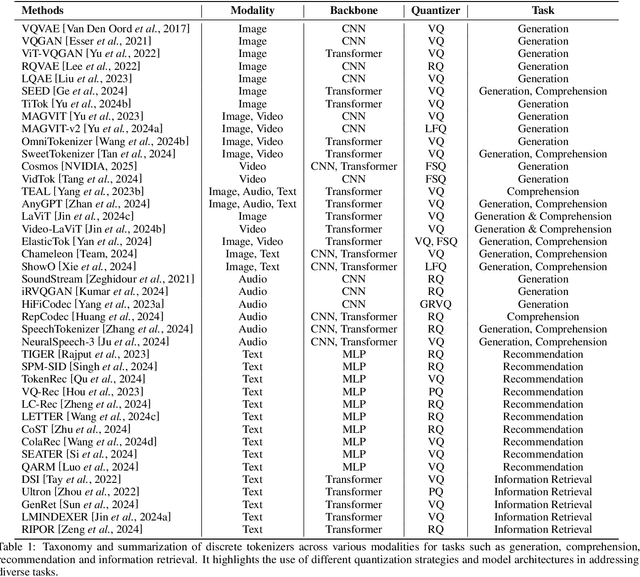
Abstract:Discrete tokenizers have emerged as indispensable components in modern machine learning systems, particularly within the context of autoregressive modeling and large language models (LLMs). These tokenizers serve as the critical interface that transforms raw, unstructured data from diverse modalities into discrete tokens, enabling LLMs to operate effectively across a wide range of tasks. Despite their central role in generation, comprehension, and recommendation systems, a comprehensive survey dedicated to discrete tokenizers remains conspicuously absent in the literature. This paper addresses this gap by providing a systematic review of the design principles, applications, and challenges of discrete tokenizers. We begin by dissecting the sub-modules of tokenizers and systematically demonstrate their internal mechanisms to provide a comprehensive understanding of their functionality and design. Building on this foundation, we synthesize state-of-the-art methods, categorizing them into multimodal generation and comprehension tasks, and semantic tokens for personalized recommendations. Furthermore, we critically analyze the limitations of existing tokenizers and outline promising directions for future research. By presenting a unified framework for understanding discrete tokenizers, this survey aims to guide researchers and practitioners in addressing open challenges and advancing the field, ultimately contributing to the development of more robust and versatile AI systems.
 Add to Chrome
Add to Chrome Add to Firefox
Add to Firefox Add to Edge
Add to Edge